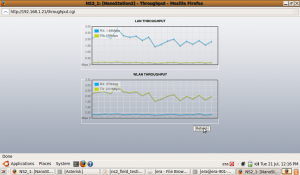
Screenshot of Nanostation 2 bandwidth testing at Old Wolverton, displayed on Asus Eee PC running Ubuntu
Today we carried out our second set of field tests. This time using our new Ubiquity Nanostation2 wifi routers. In the morning Chris, Mark and John started with a radio site survey, then did a single wifi link of about 460 meters, and had a quick check of the video streaming software (mjpgstreamer) in one direction and a two-way voip call.
laptop3(Asterisk)—¬
laptop1(Twinkle)—NS1- – – NS2—laptop2(Twinkle)
Base server / far client (i.e. from base to far)
| Distance | Base ant. | Far ant. | Bandwidth (Mbits/s) | Jitter (ms) |
|---|---|---|---|---|
| 1 x 460 m | NS2 | NS2 | 22.3 | 0.066 |
In the afternoon I joined them to set up a two hop wifi link involving two pairs of Nanostations on different wifi channels with the middle two being connected by an Ethernet cable
laptop3(Asterisk)—¬
laptop1(Twinkle)—NS1- – – NS2—NS3- – -NS4—laptop2(Twinkle)
Base server / repeating wired pair / far client (i.e. from base to far)
| Distance | Base ant. | Far ant. | Bandwidth (Mbits/s) | Jitter (ms) |
|---|---|---|---|---|
| 2 x 460 m | NS2 | NS2 | 19.5 | 0.429 |
After iperf test we also ran mjpgstreamer video (one way from John – base server to Trevor – far client) and Twinkle VoIP client to run two-way audio between John and Trevor with Asterisk running on a separate machine.
In both the morning and afternoon, Video ran smoothly and consistently (no dropping of frames), and audio ran solidly but we had some problems with the volume settings of the speakers and microphones. Clearly the Ubiquity NanoStation2s are performing well, certainly as good if not better than the Linksys WRTs we’ve used previously. The biggest surprise of the day is the quality of the link over the wired repeater – this configuration does not seem to have much impact on the bandwidth or jitter when stepping from one link out to two. Running VoIP over this set up seems very reliable.
Pingback: Portable VoWLAN: A portable voice over wireless local area network for mobile learning « VoWLAN